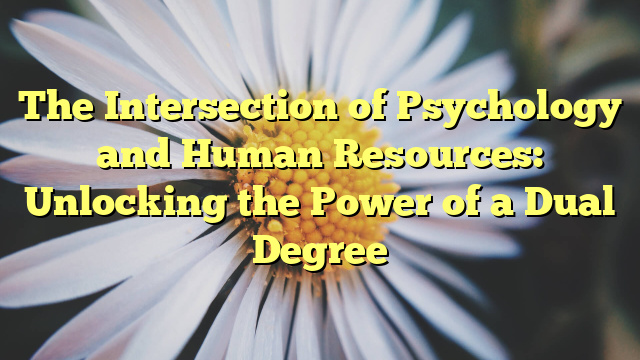The Intersection of Psychology and Human Resources: Unlocking the Power of a Dual Degree
The Intersection of Psychology and Human Resources: Unlocking the Power of a Dual Degree
Introduction
The field of human resources (HR) has evolved significantly over the years, and it is now recognized as a critical component of any organization’s success. HR professionals are responsible for managing a wide range of tasks, including recruitment, training, performance management, and employee relations. However, as the field has grown, so too has the need for professionals with a deeper understanding of human behavior and psychology. This is where the intersection of psychology and HR comes into play.
The Benefits of a Dual Degree
A dual degree in psychology and HR can provide a unique set of skills and knowledge that can be invaluable in the workplace. By combining the principles of psychology with the practical skills of HR, individuals can gain a deeper understanding of human behavior and motivation, which can be applied to a wide range of HR tasks.One of the key benefits of a dual degree is the ability to understand and manage employee behavior. HR professionals with a background in psychology can better understand the underlying motivations and needs of employees, which can help them to create more effective training programs, improve employee engagement, and reduce turnover.Another benefit of a dual degree is the ability to conduct research and analyze data. Psychology and HR both rely heavily on data analysis and research to make informed decisions. Professionals with a dual degree can use their knowledge of research methods and statistical analysis to conduct studies and analyze data, which can be used to inform HR policies and practices.
Career Opportunities
Individuals with a dual degree in psychology and HR have a wide range of career opportunities available to them. Some of the most common career paths include:- HR Manager: HR managers are responsible for overseeing all aspects of HR within an organization. They are responsible for developing and implementing HR policies and procedures, managing employee relations, and ensuring compliance with employment laws and regulations.- Training and Development Manager: Training and development managers are responsible for creating and implementing training programs for employees. They work closely with HR managers to identify training needs and develop programs that address those needs.- Organizational Development Consultant: Organizational development consultants work with organizations to improve their overall effectiveness. They may be responsible for conducting research, analyzing data, and developing strategies to improve employee engagement, productivity, and retention.- Human Factors Specialist: Human factors specialists are responsible for designing products and systems that are easy to use and understand. They use their knowledge of human behavior and psychology to design products and systems that are intuitive and user-friendly.
Conclusion
In conclusion, a dual degree in psychology and HR can provide a unique set of skills and knowledge that can be invaluable in the workplace. By combining the principles of psychology with the practical skills of HR, individuals can gain a deeper understanding of human behavior and motivation, which can be applied to a wide range of HR tasks. With a wide range of career opportunities available, a dual degree in psychology and HR can be a smart investment for anyone looking to advance their career in HR.

